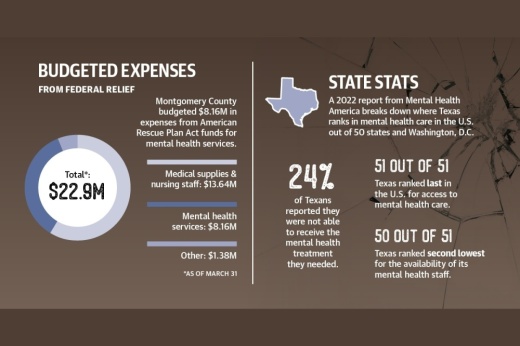“I see the need for mental health services now more than ever,” said Larisa Loera, president of Watershed Counseling Center, which plans a grand opening Sept. 24 in Montgomery.
Loera said she hopes to provide counseling services closer to home for families, youth and adults as existing mental health resources are concentrated near The Woodlands.
“There’s been a lot of growth in Montgomery County, and with the pandemic, it just intensified the need for mental health services,” she said.
Montgomery County Precinct 1 Constable Philip Cash—who helps head the county’s mental health unit and crisis intervention team—told Montgomery County Commissioners Court on July 26 the mental health unit received 4,783 calls from January-June this year, already surpassing the 4,765 calls received in the entirety of 2021.
The county expanded the unit in August 2021 with federal American Rescue Plan Act funding.
According to project and expenditure reports from the U.S. Department of the Treasury, Montgomery County budgeted $8.16 million, or more than one-third of its allocated funds for ARPA projects as of March 31, for mental health.
Statewide, a 2022 report by Mental Health America ranks Texas last out of 51 states and territories for access to mental health care. As such, local groups such as Montgomery County’s volunteer-based Behavioral Health and Suicide Prevention Task Force said they are trying to improve access. The task force was created by Precinct 1 Judge Wayne Mack in 2020, according to previous reporting.
The task force is beginning a gap analysis in September to determine what services are needed in the county, said Brenda LaVar, a member of the task force and president of the board of directors for the National Alliance on Mental Illness Greater Houston.
“When [families] can’t find help, that’s a real problem,” she said.
Uptick in mental health demand
According to Cash’s report, calls for mental health services to the unit are projected to increase to 9,566 calls by the end of 2022, a 101% increase from 2021. He said the most common category of calls from January-June was miscellaneous crisis intervention team responses, which consist of check-ins with citizens who have recently experienced mental health issues as well as those who recently completed outpatient visits with Tri-County Behavioral Healthcare, a federally qualified health center. Cash noted the ARPA funds have allowed officers to increase their follow-up frequency. Meanwhile, Evan Roberson—executive director of Tri-County—said Tri-County statistics showed as of June, the center had served 4,251 people in crisis; the center saw more children in the first six months of 2022 than in the four full years prior. However, Roberson said staffing shortages caused the center’s crisis stabilization unit to close in November.
He said people admitted to the 16-bed unit are generally uninsured and require hospitalization.
Roberson told commissioners Aug. 3 it would require nearly $2 million per year to restaff the program and pay competitive salaries, but he said he does not want to staff full-time positions using temporary ARPA funds.
“[Having those beds] is one of the biggest needs for this county, for law enforcement,” Precinct 3 Commissioner James Noack said Aug. 3. “Not having them is a disservice.”
Barriers to access
In addition to staffing challenges, local organizations said lengthy waiting lists, a lack of providers and the cost of services are barriers to receiving mental health services in Montgomery County.
The area served by Tri-County in Montgomery, Walker and Liberty counties is designated as a high-needs health care professionals shortage area for mental health, according to the U.S. Health Resources and Service Administration.
In addition, a 2022 report from Mental Health America shows there were 830 residents per mental health provider in the state, ranking Texas second lowest for provider availability in the U.S.
Sherry Burkhard, director of education for Mosaics of Mercy—a nonprofit based in Montgomery County that helps residents find mental health services—said providers often have a waiting list for new clients.
“Since [the peak of the pandemic], our call volume has leveled out, ... but what we have seen is an increase in the complexity in calls and the difficulty in connecting to providers,” she said.
According to the NAMI, 43.4% of adults in Texas reported symptoms of anxiety or depression in February 2021, of which 26.4%—or 839,000 adults—were unable to get needed counseling or therapy with the cost cited as the barrier for 45.3% of those.
However, in addition to the cost of receiving services, the lack of funding for providing mental health services is a challenge to addressing the need, said Steve Morris, lead pastor of Texas Grand Chapel. The church is in the early stages of merging with Refuge Counseling Center in Conroe to provide broader mental health services.
“Funding needs to come from somewhere,” he said. “Local legislation likely will be able to help state-funded or government-funded organizations. We need the community to stand in the gap and support nonprofit, faith-based organizations.”
State Sen. Brandon Creighton, R-Conroe, said in an August email he expects the state to build upon its mental health funding in the upcoming legislative session, which will begin in January. He said the state invested $100 million in 2019 to create the Texas Child Mental Health Care Consortium and $745 million for constructing mental health facilities.
“Year after year, the Texas Legislature has prioritized mental health funding, and the 2023 session will be no different,” he said in an email. “Lawmakers will work diligently to ensure communities large and small have the mental health resources they need.”
Local response
As the legislative session approaches, LaVar said the task force is working to complete its gap analysis in December with a recommendation of priority initiatives and longer-term needs. The analysis kicks off Sept. 20 with a meeting of about 100 stakeholders, LaVar said, and will also include focus groups throughout the fall.
“What’s going to make the greatest impact right now?” LaVar said. “We’re going to produce for this county what we need right now and what we need to look at in the future.”
In addition, Burkhard said Mosaics of Mercy is working alongside Tri-County to assemble a public database of available mental health resources to help with the difficulty of finding a provider.
With needs increasing and access lacking, Shannon Brown, the clinical director and co-owner of Refuge Counseling Center, said the counseling center and Texas Grand Chapel are working to create a campus in Conroe known as The Refuge with a coffee shop, a church and a counseling center to serve the spiritual, physical and social needs of the community. The two entities are looking for land and raising funds.
“That’s kind of why this whole team is coming together to ensure that we are doing what we feel like is our responsibility but also is a need to the community that we are removing as many barriers as we can,” Brown said. “There has been a trend of need way before COVID[-19] hit. I think people re-emerging into society is putting more of a crisis-level notification on it.”
Local resources
1. Mosaics of Mercy
33114 Forest W. St., Magnolia
346-703-0051
www.mosaicsofmercy.com
2. NAMI Greater Houston
713-970-4483
www.namigreaterhouston.org
3. Watershed Counseling Center
14855 Liberty St., Montgomery
936-297-5252
www.watershedcounselingcenter.com
4. Tri-County Behavioral Healthcare
800-659-6994 (crisis hotline)
800-550-8408
https://tcbhc.org
5. Texas mental health crisis line
Call or text 988.
Listen to The Houston Breakdown, a podcast by Community Impact Newspaper, for more on this story.






